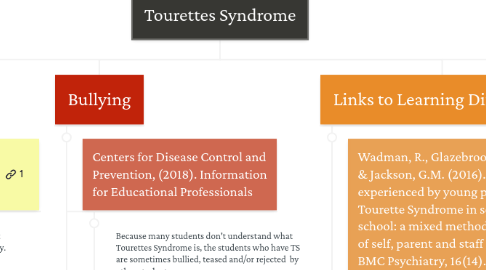
1. Intelligence
1.1. Tourette Syndrome Association of Australia. (2014). TSAA Educational In-Service Podcast.
1.1.1. TS does not affect one's intelligence, however, it can make a big difference in their learning ability. It is often the learning issues that cause more problems for the child than the tics itself.
1.1.2. The range of intelligence of people with TS is the same as any other child, from dull to bright.
1.2. Centers for Disease Control and Prevention (2018). Information for Educational Professionals.
1.2.1. Contrary to public beliefs, children with TS remain capable of similar levels of intelligence to that of their peers, regardless of hardships they may face with their disability, and in fact, can excel regardless.
1.2.2. Children with TS still need special education assistance due potential attention deficits and learning difficulties which can be linked to TS. Assistance can be in the form of seating arrangements, additional time for assessments and computer use for those who have problems with writing.
1.3. Chaturvedi, A., Gartin, B.C. & Murdick, N.L. (2016). Tourette Syndrome: Classroom Implications.
1.3.1. Most people with TS have been identified as being of average intelligence.
2. Bullying
2.1. Centers for Disease Control and Prevention, (2018). Information for Educational Professionals
2.1.1. Because many students don't understand what Tourettes Syndrome is, the students who have TS are sometimes bullied, teased and/or rejected by other students.
2.1.2. It is vital that teachers stop this negative behaviour as soon as they become aware of it. The teacher also needs to ensure that their class understands what TS is and how to react to the tics.
2.2. Chaturvedi, A., Gartin, B.C. & Murdick, N.L. (2016). Tourette Syndrome: Classroom Implications.
2.2.1. Due to the negativity associated with tics, students with TS often have low self-esteem and are socially withdrawn.
2.2.2. Many students with TS may have limited opportunities for social interaction and often are subjected to bullying from their classmates. Thus severely limiting their social experiences making them vulnerable to developing social and emotional difficulties..
2.3. Wadman, R., Glazebrook, C., Parkes, E. & Jackson, G.M. (2016). Supporting Students with Tourette Syndrome in Secondary school: a survey of staff views. Journal of Research in Special Educational Needs, 16 (4).
2.3.1. TS affects peer relationships, with a quarter of young people with TS reporting that they've experienced peer victimising and/or rejection.
3. Links to Learning Difficulties
3.1. Wadman, R., Glazebrook, C., Beer, C. & Jackson, G.M. (2016). Difficulties experienced by young people with Tourette Syndrome in secondary school: a mixed methods description of self, parent and staff perspectives. BMC Psychiatry, 16(14).
3.1.1. School work is more difficult for children with TS. Three difficulties most frequently reported by students with TS were concentration difficulties in class, unhelpful responses and lack of support from school staff to tics and difficulties with other students.
3.1.2. Additional difficulties reported were related to homework, exams, writing, anxiety and managing anger in school. TS has a high prevalence rate with learning difficulties. Conditions which frequently occur with TS are Attention Deficit Hyperactivity Disroder(ADHD) and Obsessive Compulsive Disorder (OCD).
3.2. Centers for disease control and prevention (2018). Information for Educational Professionals.
3.2.1. Some tics can make it quite difficult for students to read or write. It is important that teachers adapt their teaching to achieve the learning needs of these students.
3.2.2. A student with TS may get distracted by their own tics, or by trying to stop their tic. A way to approach this situations is to have a class meeting and discuss with the students what tics are, why they occur and how they should react to them.
3.3. Chaturvedi, A., Gartin, B.C. & Murdick, N.L. (2016). Tourette Syndrome: Classroom Implications.
3.3.1. Almost 40% of people with TS have been identified to have additional learning disabilities. Students with TS who have learning difficulties find it more difficult to control their anger.
3.3.2. Students with TS and ADHD or OCD experience more problems in controlling inappropriate thoughts and/or behaviours. Furthermore, students with TS and additional learning needs are at a higher risk of having difficulties with fine motor skills.
4. Support
4.1. Wadman, R., Glazebrook, C., Beer, C. & Jackson, G.M. (2016). Difficulties experienced by young people with Tourette Syndrome in secondary school: a mixed methods description of self, parent and staff perspectives. BMC Psychiatry, 16(14).
4.1.1. In a survey conducted, it was found that students with TS frequently encountered negative and unhelpful responses from staff. This negatively effecting their mood and confidence at school and their performance. It is vital that staff members support and help students with TS.
4.2. Tourette Syndrome Association of Australia. (2014). TSAA Educational In-Service Podcast.
4.2.1. The ability to cope in a school setting is dependant on the student's personality, family and the level of nurturing received. Home needs to be a safe a supportive place for the student, as does school. School can provide a safe place for children with TS to begin to develop coping and managing skills that will be needed as an adult.
4.3. Chaturvedi, A., Gartin, B.C. & Murdick, N.L. *Unknown year* Tourette Syndrome: Classroom Implications.
4.3.1. Regardless of the severity of their tics, all students with TS need to receive the appropriate amount of academic support and classroom accommodations to allow the students to be successful.
4.3.2. The first thing a teacher needs to do for a student with TS is to create a safe and caring classroom environment.

